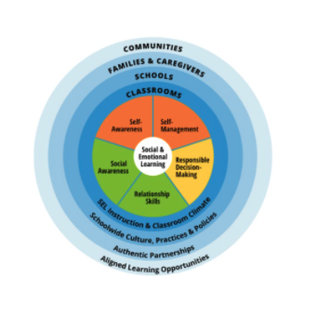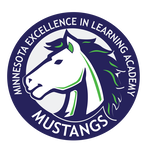 What is Social-Emotional Learning (SEL)? -Autumn Terlouw. Social Worker (MSW, LICSW) SEL stands for social-emotional learning. The Collaborative for Academic, Social, and Emotional Learning (CASEL) defines this as: “The process through which all young people and adults acquire and apply the knowledge, skills, and attitudes to develop healthy identities, manage emotions and achieve personal and collective goals, feel and show empathy for others, establish and maintain supportive relationships, and make responsible and caring decisions.” The five social-emotional learning competencies developed by CASEL are crucial to students’ learning and development.
Why is it important and how is SEL used at MELA? Social emotional learning has been shown to improve classroom success both academically and relationally. Studies show that social-emotional skills such as problem-solving, self-regulation, impulse control, and empathy help improve academics, reduce negative social behaviors like bullying, and create positive classroom climates. I believe that one thing that going through this pandemic has shown us is the importance of emotional understanding and mental health wellness. In a quote from Byron Sanders, CEO of Big Thought, he states, “By embedding SEL into explicit instruction, practice and curriculum, we can help our youth better navigate the difficult circumstances they’ll face throughout their lives. We can help them thrive, even in the midst of an unprecedented global pandemic.” At MELA, we have worked hard to build SEL into our instruction, even pre-COVID, because we believe in it’s importance. What does that look like at our school? We use a curriculum called Zones of Regulation. This framework looks to help kids build awareness of their feelings and utilize different strategies for regulation, prosocial skills, self care, and overall wellness. This is a systematic approach to teach regulation by categorizing all the different ways we feel and states of alertness we experience into four concrete colored zones. The framework is designed to help move students toward more independent regulation while also honoring and respecting each student and their unique self. We have also built SEL into 3 critical points of the school day . The beginning, middle, and end of the school day have small chunks of time dedicated to doing SEL check-ins. This can be mindfulness activities, social connectedness with peers and staff, emotional/mental health check-ins, etc. Finally, our school is trained in and practicing Positive Behavioral Interventions and Supports (PBIS). PBIS is an evidence-based three-tiered framework for improving and integrating all of the data, systems, and practices affecting student outcomes every day. It is a way to support everyone – especially students with disabilities – to create the kinds of schools where all students are successful. The implementation of PBIS in our school is manifested in the following ways:
At MELA we are mindful, empathetic, leaders, and accountable! Comments are closed.
|
Archives
May 2022
Categories |

 RSS Feed
RSS Feed

